
In the realm of interior design, the arrangement of furniture and decor often goes beyond mere aesthetics. One intriguing aspect of bedroom design that has sparked both curiosity and debate is the placement of mirrors facing beds. Beyond their decorative value, mirrors positioned in such a way can have a significant psychological impact on the inhabitants of the space.
Creating Depth and Space:
Mirrors are known for their ability to create an illusion of depth and expansiveness in a room. When strategically placed to face a bed, they can make the bedroom feel larger and more open. This sense of space can evoke feelings of freedom and relaxation, as opposed to the confinement that cramped spaces might induce.
Amplifying Natural Light:
Another remarkable feature of mirrors is their capacity to amplify natural light. When positioned across from windows, mirrors can reflect incoming sunlight deeper into the room, brightening up the space. This play of light not only makes the room feel more inviting but also contributes to a positive mood and increased energy levels.
The Dual-edged Sword of Reflection:
While mirrors can bring an array of benefits to a room’s ambiance, their reflective nature can also introduce complexities. The positioning of a mirror directly across from a bed means that it reflects the bed itself, potentially creating a visual duplication that some people might find unsettling. In psychology, this might evoke feelings of vulnerability or even unease, as one’s sleeping self is mirrored back.
Solving the Paradox:
Interior designers and Feng Shui practitioners have proposed solutions to address the paradoxical nature of mirrors facing beds. Placing a mirror where it’s not directly aligned with the bed but still reflects natural light or a pleasant view can preserve the benefits of light enhancement without invoking the uneasiness associated with mirror-to-bed alignment.
Cultivating Self-Reflection:
On a deeper level, mirrors facing beds can also be seen as a metaphor for self-reflection. Some psychological theories suggest that encountering one’s own reflection can prompt introspection and self-awareness. From this perspective, a mirror across from a bed might encourage individuals to contemplate their lives, goals, and dreams as they wake up or wind down.
Personalized Preferences:
As with many aspects of interior design, the impact of mirrors facing beds varies from person to person. Cultural background, personal experiences, and psychological inclinations all play a role in how an individual responds to this arrangement. What might create a sense of security and reassurance for one person could generate discomfort for another.
In the end, the psychological impact of mirrors facing beds goes beyond simple design guidelines. It delves into the realm of emotions, perceptions, and the intricate interplay between our external environment and internal world. Whether you choose to embrace this arrangement for its expansiveness, its potential for self-reflection, or its ability to enhance light, remember that the power of design lies not only in aesthetics but also in the emotions it stirs within us.
Certainly, here are some potential advantages of having mirrors facing beds:
Expanding the Perception of Space: Placing mirrors strategically to face the bed can create an illusion of a larger and more open room. This is particularly beneficial in smaller bedrooms where space might feel constrained. The expanded visual space can contribute to a feeling of airiness and comfort.
Enhancing Natural Light: Mirrors are excellent at reflecting light, and positioning them to catch and bounce natural light can brighten up the room. This can reduce the need for artificial lighting during the day and create a cheerful and inviting atmosphere.
Positive Mood and Energy: Well-lit spaces with ample natural light have been linked to improved mood and increased energy levels. The use of mirrors to amplify light can create a more vibrant and uplifting environment, which can have a positive impact on your overall well-being.
Functional Aesthetics: While mirrors facing beds can have psychological implications, they can also serve a practical purpose. Having a mirror in close proximity to your bed allows you to easily check your appearance and make quick adjustments before starting your day.
Design Balance: Mirrors can be used to balance the visual weight of a room. Placing a mirror across from a visually heavy element like a bed can distribute the visual interest and create a harmonious arrangement in the room.
Introspection and Self-Awareness: Some individuals find that waking up and encountering their own reflection encourages self-reflection and introspection. This can be a gentle reminder to set positive intentions for the day ahead or to take a moment to appreciate oneself.
Creating a Focal Point: Mirrors can act as an attractive focal point in the room. When placed across from the bed, they draw attention and become a decorative element that complements the overall design scheme.
Illusion of Calmness: Many people find the presence of mirrors in their bedroom calming. The reflective surfaces can create a tranquil ambiance, especially when the mirror captures and reflects serene views, artwork, or other pleasant visuals.
Easy Room Assessment: Mirrors facing beds can allow you to easily assess your entire room without having to leave your bed. This can be particularly convenient for spotting any clutter, making sure things are in order, or even enjoying the aesthetic arrangement of your space.
Personal Expression: Mirrors come in various shapes, sizes, and styles, allowing you to express your personal taste and style. A mirror facing the bed can be a unique design statement that reflects your individuality.
Remember, the advantages of having mirrors facing beds can vary based on individual preferences, cultural beliefs, and psychological responses. It’s important to consider both the aesthetic and emotional aspects of this design choice to determine whether it aligns with your personal preferences and contributes positively to your living space.
